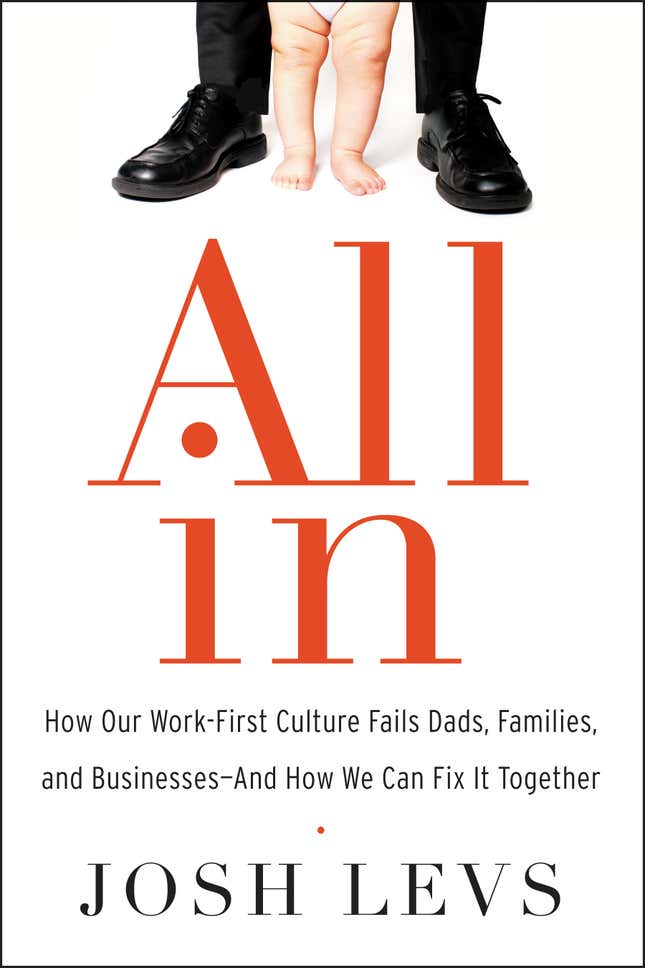My heart was pounding as I clicked “post” on a public message that I knew could change the course of my life and career, and trigger an onslaught of criticism in the process. But I had to fight for what I knew to be right. Discriminatory policies that make it harder for dads to be caregivers are hurting all of us—men, women, and children. They’re hurting businesses too.
The impact of my announcement would turn out to be bigger, more moving, and more promising than anything I had imagined. But I was really only following the lead of the many women who have spent decades fighting for equality.
My tiny, preemie girl and I would be covered on the front page of The New York Times business section and become a topic of discussion on the Today show. I’d be labeled the “poster boy” in the fight for sensible paternity leave. Organizations created by Maria Shriver and Sheryl Sandberg would speak out on my behalf. After years as a journalist, I’d suddenly be the one in the news.
It’s time for dads to go ”all in”
The post explained that I was taking legal action to contest my employer’s discriminatory policy. At Time Warner, the parent company of my employer CNN, any employee was entitled to 10 paid weeks off after having a child through birth, adoption, or surrogacy. Every employee, that is, except a man who impregnated the child’s mother. Dads who had kids the traditional way were allotted two paid weeks off.
I was needed at home for caregiving, and so had requested the full 10 paid weeks months before my daughter was born, receiving no answer. Then, 11 days after she was born prematurely, the company rejected my request. So I filed with the Equal Employment Opportunity Commission. The fight was on, and I announced it on Tumblr.

It was as though I had unleashed the floodgates—of love. Support came in from groups all over the country, and from friends and contacts across the political spectrum. Clearly, I had touched a nerve, proving men and women are in this fight together. To create change, we must speak up and support one another. In my case, it worked: Time Warner would revolutionize its policy a year later, giving more time to both moms and dads. (You can read further details about the policy change here.)
My new book All In is an extension of this fight. After interviewing men all over the country, I realized that many are struggling against the same kinds of outdated policies and stigmas that I was. Tellingly, even when these guys do get home, they still aren’t resting. According to the Families and Work Institute’s National Study of the Changing Workforce, dads who live with their kids spend an average of three hours a day with them, bathing, dressing them, playing with them, and helping with homework. Meanwhile, the Pew Research Center reports that increasingly, men and women are putting in nearly equal hours on behalf of their families when you combine paid work, childcare, and household chores.
Workplaces everywhere are stuck in the past
But our workplaces are stuck in the past. One man I spoke with, a teacher, decided to take off two years after having a child. His contract stated that any teacher was entitled to this leave. But when he asked for approval, the bosses said, oops, we only meant for that stipulation to apply to women. Another man’s employer refused to give him the time off he was legally entitled to, explaining that women should do the caregiving unless they are “in a coma or dead.”
How can women “lean in” when policies push men to stay at work, forcing women to stay home in many families? It’s no wonder the US suffers from such gender inequality in its halls of power: Women make up only 4.6% of CEOs in the S&P 500 and 20% of Congress.
Men, meanwhile, want more time at home. They suffering from the same work-life conflict as women—some even more so, according to the same Families and Work Institute study. The time warp of the American workplace is hurting us all.
Still there are some positive signs on the horizon. Every couple of weeks another business updates its policies to offer substantial paid family leave to both men and women. (Among the latest companies to do so is Johnson & Johnson.) These businesses realize that paid family leave programs are good for the bottom line and make for happier, more loyal employees. Bank of America now offers moms and dads 12 paid weeks, and finds the offering “highly valued” by employees, a spokeswoman tells me.
Incremental progress is not enough
But even this incremental progress is not enough. Some studies suggest that despite the Family and Medical Leave Act of 1993, employers are actually cutting back on how much pay they offer moms during leave and how much paid leave they offer dads.
A national paid family leave program could go a long way toward offering families choices. And there’s more political support for it than many people realize. A 2012 poll of voters in the last presidential election found 73% of Republicans, 96% of Democrats, and 87% of Independents consider it important for the country to establish a system of family and medical leave insurance. A 2015 poll of likely 2016 voters taken by the Make It Work campaign, an advocacy organization, found similar results.
State-level programs in California and New Jersey, meanwhile, have disproven the dire warnings from business groups that these programs kill jobs. In California, the Center for Economic and Policy Research (CEPR) states that a vast majority of businesses report minimal impact on operations, and either a positive effect or no noticeable effect on productivity and profits. Small businesses are even less likely than larger companies to report any problems. And in New Jersey, a 2014 study of 18 diverse businesses conducted by Sharon Lerner, of the public policy group Demos, found that six businesses considered the law neutral, while 12 said it benefited them.
I’m a big believer in the power of information. I believe many business executives want to do the right thing by their workers. And I believe that if we show them the way, they’ll pay attention. That’s what happened with me and Time Warner.
It’s easy to forget that as workers, we have power. We have rights. Our businesses need us—not just vice versa. I want my children to grow up in a world that doesn’t force parents to choose between career and family, and doesn’t rely on stereotypes to build workplace best practices. To get there, we need to rise up against this institutional sexism now—men and women, together.
